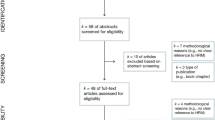Abstract
In the first part of the paper a framework is outlined which models organisational process from a learning perspective. This framework is known as the Enterprise Design Framework (EDF) and it was developed over a number of years to support work in the area of general management consultancy. The EDF is then computed with the system for systems methodologies. The complementarity of the two models is discussed and ways are identified in which each suggests refinements to the other. The use of the refined EDF is illustrated by applying it to a number of issues relevant to the systems community.
Similar content being viewed by others
References
Ackoff, R. (1979). The future of operational research is past.J. Op. Res. Soc. 30, 93–104.
Ackoff, R. L. (1983). An interactive view of rationality.J. Op. Res. Soc. 34, 719–722.
Ackoff, R. L. (1989). Dangerous dichotomies.Syst. Pract. 2, 155–158.
Ackoff, R. L., and Emergy, F. E. (1972).On Purposeful Systems, Aldine Atherton, Chicago.
Amson, J. (1985). BI-OUROBOUROS: A recursive hierarchy construction. In Noyes, H. P. (ed).,Proc. 7th Conf. ANPA.
Argyris, C. (1977). Double loop learning in organisations.Harvard Bus. Rev. 55, 5.
Argyris, C., and Schon, D. (1978).Organisational Learning: A Theory of Action Perspective, Addison-Wesley, Reading, MA.
Bateson, G. (1978).Steps on an Ecology of Mind, Granada.
Beach, L. R. (1990).Image Theory: Decision-making in Personal and Organizational Contexts, Wiley, Chischester.
Beer, S. (1966).Decision and Control, Wiley, Chichester.
Beer, S. (1983). The will of the people.J. Op. Res. Soc. 34, 797–810.
Bruner, J. (1986).Actual Minds Possible Worlds, Harvard Press, Cambridge, MA.
Carlsson, K., and Martin (1976). R&D organisations as learning systems.Sloane Manage. Rev. 17, 3.
Chapman, C. B. (1992). My two cents worth on how OR should develop.J. Op. Res. Soc. 43, 647–664.
Checkland, P. (1992). Systems and scholarship: The need to do better.J. Op. Res. Soc. 43, 1023–1030.
Flood, R. I., and Jackson, M. C. (1991).Creative Problem Solving, Wiley, Chichester.
Fripp, J. W. (1982). Problem-solving styles.J. Op. Res. Soc. 33, 77–79.
Gagnè, R. M. (1970).The Conditions of Learning, Holt, Rinehart & Winston, New York.
Garratt, R. (1987).The Learning Organization, Fonatana, London.
Hess, R. A. (1987). A qualitative model of human interaction with complex dynamic systems.IEEE Trans. Syst. Man Cybernet. 17, 1.
Huczynski, A. (1987).Encyclopedia of Organizational Change Methods, Gower, Aldershot.
Jackson, M. (1990). Beyond a systems methodologies.J. Op. Res. Soc. 41, 7657–668.
Jackson, M. (1992). With friends like this....J. Op. Res. Soc. 43, 729–731.
Juch, A. H. (1980).A General Model for Personal Development, Ph.D. disseration, University of Bath, Bath, UK.
Jung, C. G. (1923).Psychological Types, Pantheon Books, London.
Kelly, G. A. (1955).The Psychology of Personal Constructs, Norton, London.
Kolb, D. A., and Fry (1975). Towards an applied theory of experiential learning. In Copper, C. (ed.),Theories of Group Processes, Wiley, Chichester.
Lewin, K. (1951).Field Theory in the Social Sciences, Harper Bros, New York.
Miller, G. A. (1963). The magical number seven plus or minus two: Some limits in our capacity for processing information.Psychol. Rev. 81–97.
Mingers, J. (1992). Recent developments in critical management science.J. Op. Res. Soc. 43, 1–10.
Mingers, J. (1993). The system of systems methodologies—a reply to Schecter.J. Op. Res. Soc. 44, 206–208.
O'Keefe, R. M. (1989). The implication of cognitive style findings for operational research.J. Op. Res. Soc. 40, 415–422.
Oliga, J. C. (1988). Methodological foundations of Systems Methodologies.Syst. Pract. 1, 87–112.
Orman, I. (1991). Gradnularity as a determinant of system architecture.Syst. Pract. 4, 237–254.
Pask, G. (1975).The Cybernetics of Human Learning and Performance, Hutchinson, London.
Pepper, S. C. (1966).World Hypotheses, University of California Press.
Piaget, J. (1954).The Construction of Reality in the Child, Basic Books, New York.
Rickards, T. (1975).Problem Solving Through Creative Analysis, Gower, Epping.
Rosenhead, J. (1992). Into the swamp: The analysis of social issues.J. Op. Res. Soc. 43, 293–306.
Schecter, D. (1993). In defence of the system of systems methodologies: Some comments on the Mingers/Jackson debate.J. Op. Res. Soc. 44, 205–206.
Spenser-Brown, G. (1977).The Laws of Form, Julian, New York.
Sutton, D. C. (1987a). Models for developing managers.R&D Manage. 17, 1.
Sutton, D. C. (1987b). Cognitive transactional analysis—Towards a calculus of belief?Systemist 9, 1.
Sutton, D. C. (1989). Avoiding communication pitfalls in technical and business issues. In Rickardset al. (ed.),Learning from Practice, European Conference on Creativity and Innovation, The Innovation Consulting Group TNO, Delft, The Netherlands, pp. 135–140.
Sutton, D. C. (1990). Cognitive transaction analysis in practice. In Flood, R. L., and Jackson, M. (eds.),Systems Prospects, Plenum, New York, pp. 335–342.
Taket, A., and White, L. (1993). After OR; An agenda for postomernism and poststructuralism in OR.J. Op. Res. Soc. 44, 867–882.
Talbot, R. (1983). Learning styles in different situations.Creativ. Innov. Network,9, 65–70.
Tomlinson, R., and Idama, A. (1986). The personality of OR workers—Are they different?J. Op. Res. Soc. 37, 1039–1045.
Ulrich, W. (1988). Systems thinking, systems practice, and practical philosophy: A program of research.Syst. Pract. 1, 137–164.
Watzlawick, Weakland, and Fisch (1974).Change, Norton, London.
Author information
Authors and Affiliations
Rights and permissions
About this article
Cite this article
Sutton, D.C. The enterprise design framework meets the system for systems methodologies. Systems Practice 8, 409–439 (1995). https://doi.org/10.1007/BF02253394
Received:
Revised:
Issue Date:
DOI: https://doi.org/10.1007/BF02253394




